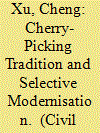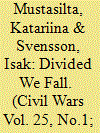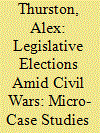| Srl | Item |
| 1 |
ID:
190419


|
|
|
|
|
| Summary/Abstract |
Conventional peacebuilding literature posits strong state capacity or empowerment of local knowledge as potential mechanisms for conflict resolution. Using process-tracing and ethnography, I show that an alternate pathway to peace lies in a dialectical approach by examining the armed conflict between indigenous Igorot communities against the Philippine state. When indigenous peoples strategically modernise by ‘cherry-picking’ and adapting traditions, they create opportunities to manoeuvre around and access state power. Exploiting the state’s own preconceived notions of indigeneity, Igorot communities defined the terms of their autonomy. This study introduces the understanding that statebuilding and indigenisation as hybrid processes for peacebuilding.
|
|
|
|
|
|
|
|
|
|
|
|
|
|
|
|
| 2 |
ID:
190420


|
|
|
|
|
| Summary/Abstract |
Why do some non-violent uprisings escalate into armed violence while others do not? We suggest that horizontal polarisation contributes to the escalation of non-violent campaigns. We examine the effect of ethnic cleavages between the campaign and its opponent and movement cohesion as explanatory factors for escalation into civil war and non-state violence. Statistical analysis of all major non-violent campaigns (1970–2014) shows that non-violent conflicts with ethnic cleavages have a higher risk of escalating into armed violence in particular, when the conflict takes place over governmental aims. The results also indicate that movement cohesion alleviates the risk of armed escalation.
|
|
|
|
|
|
|
|
|
|
|
|
|
|
|
|
| 3 |
ID:
190416


|
|
|
|
|
| Summary/Abstract |
Protests could exhibit properties of an asymmetrical, nonconventional war when paramilitary police utilise counterinsurgency measures and decentralised protestors adopt guerrilla tactics. This study examines the structural characteristics of the 2019 Hong Kong protests and the organisation of the police and protestors. Strategic challenges seen in civil wars emerged. Blurred frontlines and identification problems escalated violence for collaboration and control. The civil war theoretical framework explains the role of civilians, the logic of violence, and the realignment of social and economic life in prolonged protests. The resemblance of society at civil war suggests civilians were forced to take sides and participate.
|
|
|
|
|
|
|
|
|
|
|
|
|
|
|
|
| 4 |
ID:
190418


|
|
|
|
|
| Summary/Abstract |
This paper investigates ruling parties’ calculations in wartime legislative elections. The paper argues that ruling parties’ strategies are shaped by opportunity structures and the party’s desire to protect party insiders, rather than simply by considerations about ‘government-held’ or ‘rebel-held’ territory. Ruling parties may adopt several strategies: (1) ceding seats to popular opposition candidates, even in government-controlled territory; (2) allowing rebels to run on the ruling party’s ticket; and (3) blatant electoral manipulation. Ruling parties may miscalculate, including about how much manipulation the population will countenance. The paper examines these dynamics through a case study of Mali’s 2020 legislative elections.
|
|
|
|
|
|
|
|
|
|
|
|
|
|
|
|
| 5 |
ID:
190417


|
|
|
|
|
| Summary/Abstract |
While in the civil wars literature grievance is often considered as a cause of violent conflict, this paper investigates how grievances are meaningful to the people who experience violence, and how these meanings are expressed in everyday actions. Through the case of the Maoist conflict in India, in this paper I explore how grievance is socially constructed and related to action according to local people’s own narratives. This study reveals that perceptions of grievance are related not only to violent actions, but also to everyday strategies to resist violence and achieve durable peace and social change at the local level.
|
|
|
|
|
|
|
|
|
|
|
|
|
|
|
|